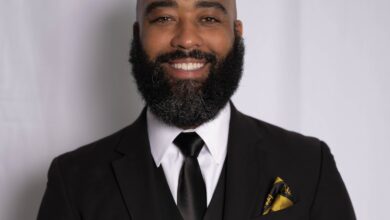Civil Rights Activism in Atlanta Was Reshaped by Organizers Like Da’Shaun Harrison

Unfortunately, as the group experienced more success and visibility, members say they faced critiques and, at times, hostility from local officials. “Often, that level of hypervisibility came with a lot of scrutiny,” Harrison recalls.
Particularly as AUC students, we learn from Atlanta’s elder civil rights activists. Clark Atlanta, Spelman, Morehouse, and Morris Brown College helped give rise to the Civil Rights Movement, nurturing leaders who devoted their careers to standing up to injustice and inequality.
“It felt deeply contradictory to what the city is supposed to represent,” Harrison says. “We all know Atlanta has this Black mecca with all this Black leadership, and [is] a city through which so many Black civil rights icons came up. But in that same breath, [some leaders] were working to derail our ‘radical and revolutionary work,’ as they phrased it.”
Harrison is humble about their organizing victories, redirecting the conversation to the ongoing struggle that we face. But their track record speaks for itself. While still a college student, they went up against some of the most powerful groups in Atlanta, and, most importantly, helped covertly build an organizing ecosystem that Black organizers still benefit from today.
Around 2017, Harrison turned to writing to speak about their experience of radical transformation and creativity. They love this work, but say “the thing about capitalism is that it turns your passions into your job, that then removes your passion from the work that you do.”
“Before, it was about telling stories that often go unheard or amplifying stories that don’t get told, that are never spoken or that are spoken but never amplified,” Harrison continues. “That made me feel very passionate about the work that I was doing. And now it is my job. It’s inescapable.”
Still, Harrison confesses a deep reverence for writing: “I’m in love with the art form for what it can be, so I will never abandon it.” Today, Harrison is the editor at large at Scalawag Magazine, which is focused on revolutionary theory, community, and Black futures in the American South, and author of Belly of the Beast: The Politics of Anti-Fatness as Anti-Blackness.
In their book, Harrison theorizes on what comes next for Black organizers — and what they are fighting for on a personal level. “I understand Blackness as a terminology prescribed to us as an attempt to build and maintain anti-Blackness, which is an attempt to build and maintain white supremacy and whiteness,” Harrison says. “So I envision a beyond; a thing, a place, where we don’t have to live by the rules and, therefore, the ramifications and consequences of existing in these bodies with these markers and these identities that have long been used as ways to subjugate and objectify our bodies and being.”
Harrison adds, “That’s what I envision. That’s what I hoped for. And that’s what I’m writing for.”
Correction: This piece was updated to note that Vandergrift is a graduate of North Carolina A&T, an HBCU, but was not part of the Atlanta University Center Consortium.



